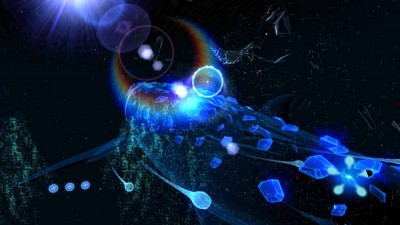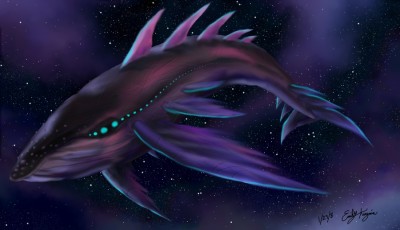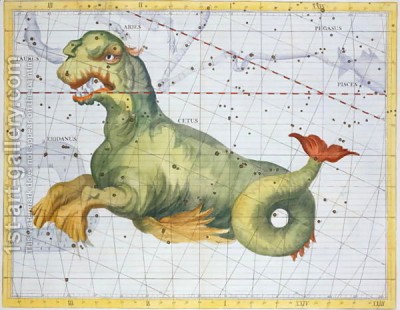Star Whale
Methinks we have hugely mistaken this matter of Life and Death. Methinks that what they call my shadow here on earth is my true substance. Methinks that in looking at things spiritual, we are too much like oysters observing the sun through the water, and thinking that thick water the thinnest of air. Me thinks my body is but the lees of my better being. In fact take my body who will, take it I say, it is not me.'
A small nervous man steps to the podium, shuffling through several data slates, tablets and even notes scribbled hastily on scraps of trash. He looks up and the congregation of people who have come to see his presentation, and at the cameras present, recording and streaming the conference online. There are many more people than he expected, with it being 3 AM, and with none of the high profile speakers and presenters being present.
He cleared his throat, 'My name is Doctor Pascale Mulder, and I have spent the last six years of my research investigating the possibility of megascale aphasic organisms.' He wipes his brow with his sleeve, eyes flitting around the room. This is fringe science, and he knows it, but the truth is there. 'Aphasic lifeforms are organisms with recognizable biological processes, behaviors and...' he stumbles over the words, but recovers, 'but are not visible to the human eye. They are invisible, much like Grimm-Olduvai observation of spaceborne planktonoids documented at the Phobos Research Facility.
Given the extremely simple structure of the plantonoids discovered, it stands to reason that there are larger, considerably more complex creatures that exist in the same state of aphasic...state' he stutters and drops some of his papers.

Appearance:
Star Whales have been documented hundreds of thousands of times by astronomers since the invention of the infrared and radio telescope, except their emanations and energy signatures have been mistakenly identified as 'background radiation' and space noise. As aphasic lifeforms, their corporeal mass exists in a different plane of existence, with them functionally being hyperdimensional beings. These energy signatures have never been considered to be anything else as they are simply too large, with the smallest measuring dozens of miles in length, and the largest hundreds of miles up towards over a thousand miles long.
'I have named these entities 'star whales' in relation to the apparent structure of the Grimm-Olduvai organisms. Doctor Samantha Grimm postulated that space could be very rich with the types of organisms she discovered, which in form and function appear and act like typical oceanic plankton. And there are creatures in our oceans that feed on these tiny organisms. Earth plankton are so small that they are almost invisible to the naked eye, and the creatures that feed on them are the largest lifeforms to have existed on the planet. Consider that the 30 meter long Blue Whale, a former resident of the world's oceans fed exclusively on organisms that were 2 to 20 mm across. Considering that Grimm's space plankton are typically 2 meters across, if we follow scale, it would make sense that the average star whale could be as large as 3 kilometers in length, and that's assuming that Grimm's plankton are 'average sized'.
Star Whales are technically Cosmic Horrors, gargantuan in size, incredibly alien in thought patterns, and largely uninterested and indifferent to what occurs around them. They move through their aphasic perception of space, from world to world, and traversing the depths of interstellar space in the same fashion as terrestrial whales move from island chain to island chain, and frequenting coastlines. These areas are where fish and plankton congregate, and where the food is is where they go.

'To the modern sensibilities whales are wonderful creatures, majestic and impressive and a bunch of other adjectives, I apologize I've never actually seen a whale,' Dr Mulder stammers, 'But if you were to ask the plankton's opinions on the whales, I am sure they would have a much different answer. To them, the whales are alien monsters that devour them by the countless billions, and that is assuming that the plankton could have the ability to even comprehend the existence of a mega predator that devours them a hundred thousand at a time.'
Dr. Mulder looks around the room, a faint tremor in his hands. He is nervous about his presentation, but he is also nervous because he hasn't made any of his following theories public domain until this presentation. The enormity of what he is about to say weighs on him, just as the anxiety of the scorn he will face after he says it.
'There is a pattern of planetary extinction events every 26 to 30 million years. I postulate that while we have given plenty of sort of okay but not really satisfactory answers, I propose that this event corresponds to the migration pattern of not a single star whale, but a school of star whales that come to our solar system to feed on the lifeforms of this planet. Given the rotation of the galaxy and a cruising speed of just 7% the speed of light, this is about how long it would take this school to complete one orbit of the galactic core, going against the rotation of course, he says.'
Concept:
If there are clouds of megascopic plankton drifting around in space, aka the Larvae of the Outer Gods, then it stands to reason that there are going to be larger more evolved creatures that exist to consume these drifters in the angles of space. The simplest explanation would be that there are going to be larvae themselves that advance to a suitably potent state to move through space, but rather than continue upwards in their progression of evolution towards becoming outer gods themselves, they instead become giant space cannibals, feeding on the swarms of their own kind. The physiology of the creature, while certainly intriguing, massive alien features, tentacles, etc, is largely unimportant in the narrative sense. As humans are on the same basic scale as the space plankton the 'filter feeding' star whales consume, the difference between a star whale, a star whale shark, and a filter feeding star giant space squid or star turtle are really unimportant.
Filter feeders
The filter feeding star whales are of little danger to anything but the larvae, as they swim through the eternal black sea. Through their various manifolds and intakes they suck in the creatures, consume them and the tiny fragments of energy they contain. Across countless eons these beasts track their courses, calving and raising their young in nebulae, and following routes they know, traveling along chains of stars, slipping into the gravity wells of stars to feed on the dense clouds of larvae that congregate there. These travelers, despite their massive size and alien appearance are predominantly apathetic and those that are actively involved in matters beyond their own ar seldom more than disinterested third parties.
The Hunters
There is a second classification of Star Whale, creatures that while superficially similar to the filter feeders, have devoted more of their ancient metabolisms to hunting down larger more advanced prey. Just as the larvae spawn and create entire biospheres Zerg/Tyrannid style, there is a creature that hunts these worlds. The Hunter dives into the gravity wells of stars, moving close to the star, where the inner planets, those hard, rocky spheres blasted by solar radiation, and actively goes to the surface seeking out prey. Hunters are rare, as there is far less of this advanced food than there is of the normal larvae. These creatures pass through star systems, leaving extinction level events in their wake, wiping out entire biomes, and leaving biospheres crippled for hundreds of thousands of years afterwards. Thankfully, these malicious star whales are few and far between.
The doctor clicked a few buttons and the image of a primitive dinosaur appears on the monitor. 'There was a massive extinction between the Triassic and Jurassic periods, and another between the Jurassic and the Cretaceous, and another at the end of the Cretaceous, and several more between us and the dinosaurs. These events all occurred during peaks of fauna populations. Species were thriving in huge numbers, huge numbers. Millions upon millions of dinosaurs, and then they are gone. We point at meteor impacts, or pandemic diseases, but none of these things fit the bill.
The appearance of an aggressive star whale, tearing into our biosphere, like it's own personal cookie jar, explains it.
The 'good news' if you can call it that, is that we have already survived it's latest passing. it's a million or so years late, but I postulate that the creature visited Earth approximately 15 years into the Resource Wars, where the records are the most damaged, and where the rate of combat decreased dramatically. The pattern of population loss doesn't match the records of Atomic, Biological, and Chemical weapons deployment. There are entire swaths of western China, and northern India that show dramatic population decrease without a corresponding strike event.
They were eaten.
Millions, tens of millions of people.
They were all eaten.
Origins and History

The Mythos of the Star Whale
In the tradition of the Lovecraft Mythos, the Star Whales are not lovely splendid magical creatures drifting through space. They are predators, near the top of the cosmic food chain. Considering a creature with a lifespan measured in hundreds of millions of years, and that some eat swarms of cosmic horrors and kaiju the way we eat lobster and shrimp, there is no real means of comparison between man and star beast. They are neither malevolent nor benign, the affairs of mankind, the affairs of almost any alien race are beneath their consideration. As aphasic energy beings, the vast majority of sentient races that encounter them never know what happened.
The only things in the Cosmos on par with Star Whales are other more predatory Star Whales, and the Outer Gods themselves. The small and petty gods that dwell around specific planets are aware of such beasts, and will go out of their way to protect those beings that worship them. In mythology, there are extinction events, great floods, cities ruined and entire nations and continents left bare. While these gods can and often do take credit, it is more often the predation of star whales, and those who survive carry on the tales they are told.
Doctor Pascale Mulder placed his notes down on the podium. 'This is the part where most of you get up and leave, because this is the most ludicrous thing you've ever heard. This is where you write down that I've lost my mind, spoiled two decades of education and embarrassed myself. He must be mad, he must have a drinking problem,' he pantomimed chugging something, 'Or he's popping pills, addicted to BTL, CRAZY!' he shouts at the audience.
He clicks a slide, looks at the screen. 'You assholes don't care about thermoscopic deep scans, and certainly nothing like these,' he rapidly clicks through the images, as he does movement does appear in the patterns. 'Yessir, gigantic space whales, and they are goddamn invisible! Can you believe that?' he turns, no longer clicking through images of anomalous patterns in interstellar dust belts. 'You, you there, in the front row. Look at this, what do you think? You think there is something here? You think that we might be on the cusp of realizing our place in the universe, maybe just maybe becoming ready to make that evolutionary leap from a sedentary species, to a self determining one?
He looked at them, his chest heaving. His eyes sparkled with a maniacal energy.
'No, no we're not,' he said looking at them, he returned to the podium and picked up his things. 'The presentation is over.'
'So's your career!' someone shouted from the back of the room.
Not Registered Yet? No problem.
Do you want Strolenati super powers? Registering. That's how you get super powers! These are just a couple powers you receive with more to come as you participate.
- Upvote and give XP to encourage useful comments.
- Work on submissions in private or flag them for assistance.
- Earn XP and gain levels that give you more site abilities (super powers).
- You should register. All your friends are doing it!
? Responses (12)
I liked the lecture bit, perhaps the Golgafrinchan's didn't make up that whole space goat idea. You give us the concept of the space whale. It is an interesting idea for explaining mass extinctions because it forces a view of human existence that places humanity as citizens of the galaxy. But because the space whale is so difficult for humanity or any person to interact with the idea it is difficult to engage with. Thus like the lecturer we are left with nothing to do but throw up the hands of our imaginations.
What can you say about giant untouchable (almost unknowable) space whales ( that treat our planet like a cookie jar) that sucks.
Perhaps Moby Dick and the space whale are the last elements of nature that man can not conquer and thus must turn to religion in order to understand his role in the universe? But Moby Dick and Ahab had history, a relationship. There can be no personal relationships with a star whale.
This is not Moby Dick though and could not serve any direct function in storytelling.You could go out and look for Moby Dick. You could look for and physically wrestle with that embodiment of natural death living among man's violent oppression and exploitation of the natural world.
Excellent commentary.
The main inspiration behind the Star Whales was the plankton like nature of the Larvae of the Outer Gods, and the terrestrial concept of the worlds largest creatures subsist on eating some of the world's smallest creatures. Move everything up to the space scale, and the star whales are large predators in a galaxy wide sea of stars.
Moving back to your commentary, no there cannot be any sort of personal relationship between a star whale and a human. While they are untouchable and unknowable, this is a function of the setting and technology. The advances in arcanotechnology might appear to have exploded outwards like a technological big bang, the Star Whales and their utterly alien existence are a demonstration that rather than being masters of technology and space, we are much closer to the ancient Greeks discussing the theorems of the six simple machines but rather than the Inclined Plane, Wedge, Screw, lever, wheel and axle, and pulley we looking at Dimensional Tap Reactors, Dimensional Heat Sinks, the AISC, and so forth. Eventually, should the stars align right, mankind will have all sorts of ships and technology to find the Star Whales, and follow them, and hunt them, and render them for their exotic aphaisic organs and all the horrible things that we are pretty good at doing.
But that's 10,000 years down the line, figuratively speaking.
Another concept is the depth of time. The Lovecraft mythos discussed things eons in the past and millennia in the future. The lifecycle of the larvae of the outer gods is tens of millions of years, and the star whales hundreds of millions of years, and the galaxy has it's own megascale 'ecosystem' where we are barely aware of just the luminous stuff in said galaxy, let alone the things we don't yet have the ability to comprehend.
Absolutely perfect addition to the Mythos. I'm a sucker for anything remotely Lovecraftian. My whole years long D&D game was just so, and these would have fit just right. I will DEFINITELY use this at some point!. I agree the lecture was great.
For me the issue with Lovecraft in RP is that it breaks down when it comes to the players. The point of these things is that they are unknowable and so beyond the pale of understanding. So how is a star-whale supposed to be usable in a game other than background flavor?
That being said, the idea of the invisible food chain is an excellent one. What happens when a space whale dies? Are there decomposers? Scavengers?
Props to Aramax for the HoH, this was an enjoyable read I would have missed.
Amazing concept and great execution here!!! I also missed this somehow. That is now rectified. The commentary is marvelous too. Just an awesome creation here Scras, and I find that it bothers me little if at all, that players wouldn't be able to interact with this monumental creature. They'd have as much fun just pondering its existence, as any reader of the sub would.

So how would you unpack this to for your group?

Great question, axle.
I kind of answered it above. I'd say, 'hey fellas and gals, we are going to space-opera/sci-fi/Cthulhu it up tonight! So check this out...this is some of the kind of stuff I mean, for tonight's 'flavor'/genre/atmosphere.... 'The Star Whale...'
Players: 'Ohhhhh, interesting...' (they get ideas and start chattering...) GM: *Grins* (and get ideas from their chatterings...)
Of anything on this site ,I WILL use this as an epic baddie in a game,will run mini or maxi campaign around concept. Can't tell you how much I love this except w more HOHs
I re-read this yesterday at Aramax's urging, and there was one point on which I was mistaken when I first read this. I had thought (I am not sure why) that the star whales were much bigger than they are described here. I was picturing beast hundred of thousands of kilometers long that could be 'seen' by radio telescopes light years away. I was picturing things that existed in a different dimension of size as well energy and their passing through the solar system was destructive as they absorbed energy and matter.
I think perhaps the citizens of the cosmic era could indeed interact with these things or at least make an attempt to do so. They are not written as unknowable a beast as they are literally described to be.
But on the re-read I was also reminded that seminar presented here is the real gem of this piece.
Took this sub as core statement of my new campaign, working all the game logic around this(although I'm doing the destruction cycles as 1000 years)Thanx so much for the inspiration!!!!!!!!
A cosmic gem!
This is really neat - food for thought. Maybe these space plankton could explain Dark Matter, at least in the Cosmic Era universe :)
